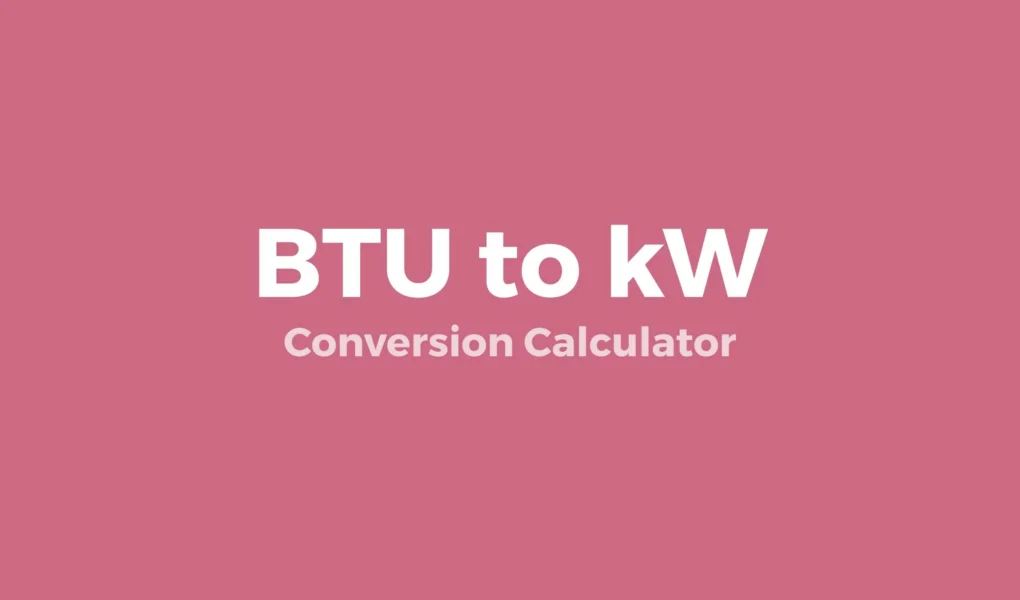Energy efficiency is a critically important issue for today’s homeowners and professionals, for a multitude of reasons.
The cost aspect is certainly one of those reasons. Indeed, in 2023, the UK had the highest industrial electricity prices among the 24 countries reporting to the International Energy Association (IEA).
Improving energy efficiency, then, is a direct way for families and businesses alike to manage the impact of persistently high energy costs.
But of course, there is also the all-important environmental angle. Energy efficiency plays a vital role in driving down greenhouse gas emissions, making it a key weapon in the fight against climate change.
The Role of BTU To kWh Conversions in Ensuring Energy Efficiency
So, we have established above that paying close attention to energy efficiency – and striving to optimise it – is important.
But if you are reading this as a homeowner or a professional in the UK, achieving the goal of enhanced energy efficiency will likely depend on your ability to understand and compare energy use across different heating and cooling systems.
That, in turn, may often mean having to convert between the traditional British Thermal Unit (BTU) and the more common kilowatt-hour (kWh).
After all, while the former is commonly used in the UK to rate the heating or cooling capacity of appliances like boilers, radiators, and air conditioning units, it is the latter that is the standard unit used on most energy bills.
- If you are a homeowner, being able to perform quick and accurate BTU to kWh conversions will help you compare the cost and efficiency of heating and cooling equipment with your electricity bills. This can be key to your efforts to decide on the most suitable appliance for your needs.
- If you are an engineer, rapid and precise conversions from BTU to kWh will help you compare and standardise energy measurements. Being able to convert between these units is essential for planning and optimising energy systems, accurately budgeting for energy costs, and comparing the performance of appliances like air conditioners or furnaces to their actual electricity use.
Understanding The Units of BTU And kWh
Let’s be clear about what the exact distinctions are between these units of measurement:
- British Thermal Unit (BTU)
A BTU is an imperial unit of energy that measures the amount of heat necessary to increase the temperature of one pound of water by a single degree Fahrenheit. A single BTU is approximately equivalent to the heat energy that a single wooden match produces.
Over the course of the last half-century, the UK has largely switched to the metric system. However, BTU remains in widespread use in the HVAC (heating, ventilation, and air conditioning) industry.
- Kilowatt-Hour (kWh)
A kWh is a metric unit of energy used to measure the amount of electricity a household has consumed. It is the standard unit for billing.
A single kilowatt-hour is equivalent to using 1,000 watts of power for one hour. So, a 1,000-watt appliance running for one hour consumes 1 kWh of energy.
Whether you are reading this in a personal or a professional capacity, if you can achieve a uniform scale for comparison, this will greatly support your efforts to improve energy efficiency. This is where it can become essential to convert between BTU and kWh.
The Simple Formula for BTU And kWh Conversions
To convert between these two units, you just need to apply the formulas below:
- To convert from BTU to kWh, multiply the BTU value by 0.000293
- To convert from kWh to BTU, multiply the kWh value by 3,412
That’s it! So, for example, a portable air conditioner rated at 12,000 BTU will use about 3.52 kWh if it runs continuously for one hour. You can see this because the relevant calculation is: 12,000 BTU x 0.000293 = 3.516 kWh.
Don’t Forget, There’s Also the Option of Using a Trusty Online Calculator
The formula we cited above may be straightforward, but if you’re dealing with large systems or multiple appliances, a succession of manual calculations can become quite time-consuming.
So, why not navigate to the website of the electrical component supplier RS, and convert with the BTU to kWh calculator for heating and cooling systems in your commercial or domestic property? Doing so will enable you to get a quick and accurate result every time.
By simplifying your energy calculations with the use of the right digital tool, you can take control of your energy management, drive down your carbon footprint, and achieve significant savings on utility bills, whether as an individual or an organisation.




